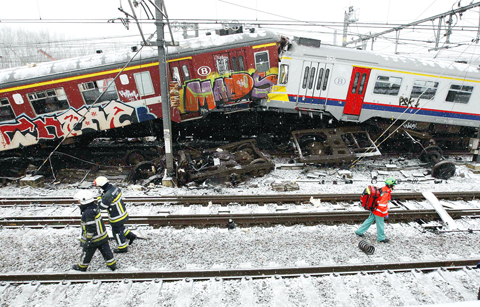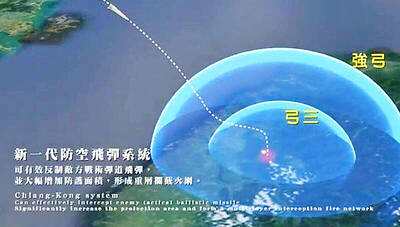Two packed commuter trains collided head-on during rush hour outside Brussels yesterday, killing at least 20 people, a local mayor told Belgian media.
The crash left several carriages on their side, witnesses said, while an official said doctors were carrying out amputations at the scene.
The two trains hit each other near the town of Halle, about 15km southwest of Brussels in Dutch-speaking Flanders.

PHOTO: REUTERS
Halle Mayor Dirk Pieters told Flemish public television VRT and national press agency Belga that there were “at least 20 dead.”
“All the emergency services are there. The most serious injuries are being treated at the scene before being taken to hospital,” the mayor said.
Belgian Secretary of State for Mobility Etienne Schouppe told the RTBF broadcaster there were many seriously injured at the scene who needed amputations.
“The collision was brutal, the train didn't brake,” one unnamed passenger was quoted as saying by the RTL television news Web site. “Wagons have been turned over, lots of people are in shock.”
Neither the national rail company, SNCB, nor the track operator, Infrabel, were able to confirm the toll. Infrabel spokeswoman Fanny Charpentier said police believed there were at least 12 dead.
One train was going from Quievrain to Liege and the other from Leuven to Braine-le-Comte, Infrabel said.
The accident caused major rail traffic disruption.
Thalys and Eurostar high-speed train services in and out of Brussels were seriously disrupted, the two operators said.
Thalys advised passengers to change their travel plans.
Eurostar said services might “remain suspended all day.”

LIMITS: While China increases military pressure on Taiwan and expands its use of cognitive warfare, it is unwilling to target tech supply chains, the report said US and Taiwan military officials have warned that the Chinese People’s Liberation Army (PLA) could implement a blockade within “a matter of hours” and need only “minimal conversion time” prior to an attack on Taiwan, a report released on Tuesday by the US Senate’s China Economic and Security Review Commission said. “While there is no indication that China is planning an imminent attack, the United States and its allies and partners can no longer assume that a Taiwan contingency is a distant possibility for which they would have ample time to prepare,” it said. The commission made the comments in its annual

DETERMINATION: Beijing’s actions toward Tokyo have drawn international attention, but would likely bolster regional coordination and defense networks, the report said Japanese Prime Minister Sanae Takaichi’s administration is likely to prioritize security reforms and deterrence in the face of recent “hybrid” threats from China, the National Security Bureau (NSB) said. The bureau made the assessment in a written report to the Legislative Yuan ahead of an oral report and questions-and-answers session at the legislature’s Foreign Affairs and National Defense Committee tomorrow. The key points of Japan’s security reforms would be to reinforce security cooperation with the US, including enhancing defense deployment in the first island chain, pushing forward the integrated command and operations of the Japan Self-Defense Forces and US Forces Japan, as

INTERCEPTION: The 30km test ceiling shows that the CSIST is capable of producing missiles that could stop inbound missiles as they re-enter the atmosphere Recent missile tests by the Chungshan Institute of Science and Technology (CSIST) show that Taiwan’s missiles are capable of intercepting ballistic missiles as they re-enter the atmosphere and pose a significant deterrent to Chinese missile threats, former Hsiung Feng III missile development project chief engineer Chang Cheng (張誠) said yesterday. The military-affiliated institute has been conducting missile tests, believed to be related to Project Chiang Kung (強弓) at Pingtung County’s Jiupeng Military Base, with many tests deviating from past practices of setting restriction zones at “unlimited” and instead clearly stating a 30.48km range, Chang said. “Unlimited” restrictions zones for missile tests is

NO CHANGES: A Japanese spokesperson said that Tokyo remains consistent and open for dialogue, while Beijing has canceled diplomatic engagements A Japanese official blasted China’s claims that Japanese Prime Minister Sanae Takaichi has altered Japan’s position on a Taiwan crisis as “entirely baseless,” calling for more dialogue to stop ties between Asia’s top economies from spiraling. China vowed to take resolute self-defense against Japan if it “dared to intervene militarily in the Taiwan Strait” in a letter delivered Friday to the UN. “I’m aware of this letter,” said Maki Kobayashi, a senior Japanese government spokeswoman. “The claim our country has altered its position is entirely baseless,” she said on the sidelines of the G20 summit in Johannesburg on Saturday. The Chinese Ministry